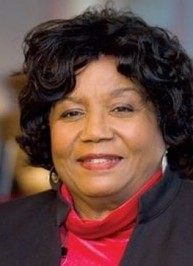 Last week, Dr Melba Beals, one of the “Little Rock Nine”, shared her story with RCFC and many others - more than 327 were connected by Zoom for this special presentation. Some of us are old enough to remember the TV images of the USA 101st Airborne escorting black students into Little Rock Central High School. Now we know what it was like to be one of those students. Dr. Beals provided a relaxed, conversational presentation reminding this writer of a family gathering where your most experienced family member was sharing her history.
Last week, Dr Melba Beals, one of the “Little Rock Nine”, shared her story with RCFC and many others - more than 327 were connected by Zoom for this special presentation. Some of us are old enough to remember the TV images of the USA 101st Airborne escorting black students into Little Rock Central High School. Now we know what it was like to be one of those students. Dr. Beals provided a relaxed, conversational presentation reminding this writer of a family gathering where your most experienced family member was sharing her history.
Dr. Beals began by reminding us what black people want and don’t want. Putting conspiracy and fear-based bigotry aside we see that what they want is what we all want – a voice, a choice (including an unencumbered opportunity to vote), and inclusion, “a seat at the table”…
Now the very personal story begins. Melba was born on December 7, 1941 (Pearl Harbor Day). Jim Crow laws and racial segregation became very personal at a young age. She knew she was headed for a Black school and was often otherwise reminded that she was a ”second class citizen”. Even her daddy’s strong arms could not protect her from an armed white man. She learned the adults in her life could not protect her; even her place of worship was not a haven. At 5 years of age she witnessed her first lynching.
But what possessed her to enter a segregated white high school? She didn’t think of herself as a hero; but she got good grades, wanted the best education possible as a way out of Little Rock, and believed in herself, sure that people would accept her based on her merits. She didn’t like being told “no” or reminded of “what she could not do”, and therefore was ready to integrate when the opportunity arose.
As she entered Little Rock Central she was confronted, then chased a mob for the first time, enabled/enhanced by the Arkansas National Guard, deployed by Governor Orval Faubus to keep the Black students out. Over the next few days the mob increased in size, while the courts and the Little Rock police intervened. But the mob prevailed and the black students were forced to escape the school in police cars.
It was clear that local government was neither inclined to, or capable of, protecting these students. TV images and national outcry forced the Federal Government to act. President Eisenhower sent in the elite USA 101st Airborne to escort and protect the 9 students. Each student had their own 3-person guard team and Melba learned a great deal about personal survival from her primary soldier. Eight completed (survived) the year - one was expelled for spilling a bowl of chili over an attacker. In spite of this protection, her year was one long string of personal insults and attacks. The following year schools were closed by Governor Faubus.
The NAACP recommended relocation of the remaining eight students, Melba’s grandmother died and it was time to leave Little Rock. Melba moved to California to live with a white Quaker family, who loved her like a blood relative. They, in her words, “healed my soul”. She enrolled in another “white” school, Montgomery High, where her experience without racism also had a profound effect. Melba reminds us that, ultimately, our problems with racism can be solved by Love and Respect.
Two people changed the direction of our speaker’s life - Martin Luther King visited Little Rock and told Melba that what she was doing was not just for herself but for ”generations to come”. Her other source of inspiration, her grandmother, taught her many things, including not to cry (see Dr Beale’s book, Warriors Don’t Cry).
In the Q & A we were reminded that who we are is determined by who we believe we are. Today, with so many different “news” sources it behooves each of us to seek the truth and then act on it. Besides, why do we still need to waste time on racism when there are so many issues that affect all of us equally such as the changing environment (and, I might add COVID-19).
 Last week, Dr Melba Beals, one of the “Little Rock Nine”, shared her story with RCFC and many others - more than 327 were connected by Zoom for this special presentation. Some of us are old enough to remember the TV images of the USA 101st Airborne escorting black students into Little Rock Central High School. Now we know what it was like to be one of those students. Dr. Beals provided a relaxed, conversational presentation reminding this writer of a family gathering where your most experienced family member was sharing her history.
Last week, Dr Melba Beals, one of the “Little Rock Nine”, shared her story with RCFC and many others - more than 327 were connected by Zoom for this special presentation. Some of us are old enough to remember the TV images of the USA 101st Airborne escorting black students into Little Rock Central High School. Now we know what it was like to be one of those students. Dr. Beals provided a relaxed, conversational presentation reminding this writer of a family gathering where your most experienced family member was sharing her history.